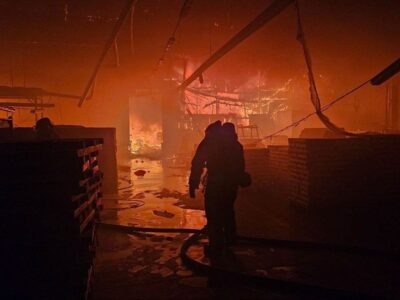ROME – Pope Francis has condemned the routine use of “conventional weapons” against civilian targets in a message to Ghanian Cardinal Peter Turkson, sent the day after a warehouse in Ukraine containing several tons of humanitarian aid was destroyed in a Russian drone attack.
In his Sept. 19 message, the pope pointed to what he said were “the increasingly urgent ethical problems raised by the use in contemporary warfare of so-called ‘conventional weapons,’ which should be used for defensive purposes only and not directed to civilian targets.”
“It is my hope that sustained reflection on this issue will lead to a consensus that such weapons, with their immense destructive power, will not be employed in a way that foreseeably causes ‘superfluous injury or unnecessary suffering,’ to use the words of the St. Petersburg Declaration,” he said.
The pope’s message was published the day after a Russian drone attack destroyed a warehouse in Lviv belonging to the Caritas-Spes charitable organization, and which contained more than three tons of humanitarian aid.
Secretary General of Caritas Internationalis Alistair Dutton, who is currently in New York attending a United Nations General Assembly, and which Ukrainian President Volodymyr Zelenskyy also spoke at, condemned the destruction.
“Russia’s attack on the Caritas-Spes Ukraine warehouse in Lviv last night, destroying 300 tons of humanitarian aid for the people of Ukraine, was an outrage and a flagrant violation of International Humanitarian Law,” he said.
No employees were harmed in the attack. However, the CEO of Ukraine’s Caritas-Spes branch, Father Vyacheslav Grynevych, said the warehouse and everything inside was destroyed, including food, hygiene kits, generators, and clothes.
Some of the aid packages destroyed had arrived just that night from Caritas Poland and had been destined to support some 600 families in Ukraine. Following the warehouse’s destruction, Caritas Poland has pledged to send additional support for families in need.
Auxiliary Bishop Eduard Kava of Lviv said Caritas had been using the warehouse for the past year and a half, and that “from this place, humanitarian aid was transported further east in Ukraine to those in need.”
“Everything was destroyed,” Kava said, but voiced relief that no employees or security guards were on site when the warehouse was attacked.
The UN Office for the Coordination of Humanitarian Affairs (OCHA) and various media outlets have reported that humanitarian warehouses are increasingly being targeted by Russian forces in its ongoing war with Ukraine. In May, two warehouses belonging to other humanitarian organizations were attacked in Odessa and Ternopil.
Russia has also been repeatedly accused of targeting civilian areas and is being investigated by the International Criminal Court for alleged war crimes.

In April 2022, the UN suspended Russia from the UN Human Rights Council and by October of last year, and it remains under investigation in Ukraine for alleged killings of civilians, kidnappings, indiscriminate bombings, and sexual assaults.
Pope Francis’s letter to Turkson, chancellor of the Pontifical Academy of Social Sciences (PASS), was sent for a conference organized by the PASS and the Peace Research Institute Oslo that currently taking place from Sept. 19-20 at the Vatican’s Casina Pio IV to commemorate the 60th anniversary of the April 1963 publication of Pope Saint John XXIII’s landmark encyclical Pacem in Terris.
The encyclical outlines the Vatican’s position on the rights and obligations of both people and states offers John XXIII’s vision for proper interstate relations. Among other things, it also emphasizes human dignity and equality and advocates for women’s rights, nuclear nonproliferation, and supports the United Nations.
Francis’s letter marks the first public correspondence between him and Turkson since Turkson was effectively ousted from his position as head of the Vatican’s Dicastery for Integral Human Development in January of last year over disputes over his management of the department.
It also comes after the pope came under fire for praising “Great Mother Russia” in a video call with Russian youth, with the comment condemned by Ukrainian officials as “imperialist propaganda,” and by Ukrainian bishops, who were in Rome for their annual synod last week, and called the remarks confusing, concerning and painful for Greek Catholic faithful in Ukraine.
Francis in his message to Turkson called the conference on Pacem in Terris timely, saying it is taking place “as our world continues to be in the grip of a third world war fought piecemeal, and, in the tragic case of the conflict in Ukraine, not without the threat of recourse to nuclear weapons.”
“The current moment ominously resembles the period that immediately preceded Pacem in Terris, when in October 1962 the Cuban missile crisis brought the world to the brink of widespread nuclear destruction,” the pope said, noting that in the years since, the number and potency of nuclear weapons has grown.
Investment in other weapon technologies has also grown, “and even the long-standing consensus to prohibit chemical and biological weapons is coming under stress,” he said.
He quoted John XXIII’s admonition that, “relations between States, as between individuals, must be regulated not by armed force, but in accordance with the principles of right reason: the principles, that is, of truth, justice and vigorous and sincere cooperation.”
Follow Elise Ann Allen on X: @eliseannallen













